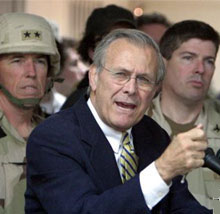|
Report: Rumsfeld OK'd prison program
(Agencies)
Updated: 2004-05-16 09:08
The Abu Ghraib prison scandal was not the result of a few misguided soldiers, but of a decision last year by U.S. Defense Secretary Donald Rumsfeld to expand a clandestine operation against al Qaeda to the treatment of prisoners in Iraq, according to a report in The New Yorker.

U.S. Defense Secretary Donald Rumsfeld speaks to U.S. troops May 13, 2004 at Abu Ghraib prison near Baghdad. [AP] |
Rumsfeld's goal was to bring the success of the secret terrorism program to Iraq in an effort to "generate more intelligence about the growing insurgency," the magazine reports.
The rules governing the secret operation were "Grab whom you must. Do what you want," according to a former intelligence official whom Seymour M. Hersh quotes anonymously in "The Gray Zone."
The Pentagon sharply rejected the author's conclusions.
"Assertions apparently being made in the latest New Yorker article on Abu Ghraib and the abuse of Iraqi detainees are outlandish, conspiratorial, and filled with error and anonymous conjecture," Pentagon spokesman Larry DiRita said.
Seven U.S. Army Reserve military police have been charged with abusing inmates at the prison near Baghdad. Three of the soldiers face arraignments Thursday for general courts-martial, used for felony-level offenses. A fourth soldier faces a special court-martial -- the military equivalent of a civilian misdemeanor court -- Wednesday.
Photos of that abuse -- some showing men in humiliating sexual positions -- enraged people around the globe after CBS's 60 Minutes II broadcast the snapshots.
Hersh's article attempts to explain the history of the policy that led to the abuse.
Hersh, who has won a Pulitzer and dozens of awards for investigative reporting, concludes that the "roots of the Abu Ghraib prison scandal lie not in the criminal inclinations of a few Army reservists," but in the August 2003 decision by Rumsfeld.
His article has been posted online at the New Yorker's Web site and will be published in the May 24 issue of the magazine, on newsstands Monday.
The U.S.-led military coalition in Afghanistan confirmed Saturday that a second investigation has been initiated into allegations of detainee abuse at the hands of U.S. jailers.
On Wednesday, the U.S. Embassy in Afghanistan announced that the military was investigating the alleged mistreatment of an Afghan police colonel while in the custody of coalition forces.
The officer says he was stripped naked, photographed, kicked and subjected to sexual taunting while being held by coalition forces in August, according to an embassy statement.
On Friday, the Pentagon announced that the U.S. military will not use certain prisoner interrogation procedures in Iraq and Afghanistan, including sleep and sensory deprivation, as a result of the Abu Ghraib prison scandal.
Earlier in the week, top officials acknowledged that some of the techniques being reviewed could violate the Geneva Conventions, which were adopted internationally as a way to protect prisoners of war from abuse.
It remains unclear whether the ban applies to accused Taliban and al Qaeda detainees held by the U.S. military in Guantanamo Bay, Cuba.
Hersh's article notes that Maj. Gen. Geoffrey Miller was summoned to Baghdad from Guantanamo to evaluate the prison system.
An internal Army report on the prisoner abuse charges written in February by Maj. Gen. Antonio Taguba quotes Miller as saying "detention operations must act as an enabler for interrogation."
Recent Senate hearings, Hersh writes, indicate that Miller supported using the methods used in Guantanamo, including sleep deprivation, and exposure to extremes of cold and heat.
|